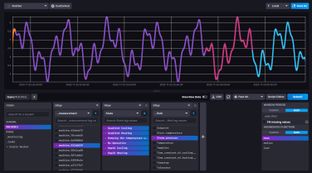
Container Based Distributed Simulation
- Project
- 19034 MIRAI
- Type
- New product
- Description
Leveraging Docker containers, this simulation accelerates control algorithm development, enabling simultaneous operation, interaction, & seamless communication among multiple machines. InfluxDB captures data, visualised in real-time through Grafana, allowing continuous monitoring of the batch process. RabbitMQ ensures efficient data sharing and Loki integration provides detailed logs for tracking and analysis.
The solution offers a rapid & secure platform for algorithm development across diverse industries. It is especially valuable for testing rule-based AI solutions in distributed systems.
- Contact
- Barış Bulut (Enforma); Sencer Sultanoğlu (Eliar)
- sales@enforma-tr.com
- Research area(s)
- Optimal process control, AI
- Technical features
• Containerization Technology: Utilizes Docker containers to ensure portability, scalability, and efficient deployment of the simulation across diverse environments. • Data Capture and Visualization: Captures machine-generated data in real-time, storing it in InfluxDB, and provides a visual representation through Grafana for comprehensive monitoring. • Communication Facilitation: Enhances communication among machines using RabbitMQ, facilitating seamless data sharing and optimizing interaction. • Log Recording and Analysis: Integrates Loki for centralized log recording, offering comprehensive logs for detailed tracking and analysis of machine activities. • Scalability: Allows the simulation of a variable number of machines simultaneously, demonstrating scalability in handling diverse scenarios. • Real-time Monitoring: Provides comprehensive and real-time monitoring features for continuous processes and interactions, accessible through both InfluxDB and Grafana. • Cross-Platform Compatibility: Ensures compatibility across different systems by containerizing applications, allowing seamless deployment in varied environments. • Adaptive Simulation Speed: Achieves rapid results by providing the flexibility to run the simulation in both real-time and fast modes. For a simulation involving 10-15 machines, approximately one day's production data can be generated in around ten minutes. • Machine Learning Integration: Integration of machine learning models is easily achievable with the provision of necessary libraries. Facilitates smooth collaboration between the simulation and machine learning models.
- Integration constraints
Operating System Requirement: • The underlying operating system must support Docker Swarm. The simulation relies on containerization, necessitating an environment where Docker Swarm can operate seamlessly. • The minimum requirements depend on the amount of data and the number of machines (replicas) to be created in the simulation.
Docker & System Requirements: • 64-bit kernel and CPU support for virtualization. • Minimum of 4 GB of RAM to accommodate the simulation's data and the number of machines created. • BIOS-level hardware virtualization support. • Loki Docker driver for enhanced container orchestration.
Backend Services: • RabbitMQ v3.9.15 • InfluxDB v2.1.1 • Grafana v8.5.4 • Loki v2.3.0
Requirements for Data Sharing and Control Scripts: • Python v3.8.11 • numpy v1.22.3 • pika v1.2.0 • influxdb-client v1.25.0
- Targeted customer(s)
Textile industry technical services, R&D organizations, Energy industry (energy distribution)
- Conditions for reuse
Licensing
- Confidentiality
- Public
- Publication date
- 22-11-2023
- Involved partners
- Enforma Information and Communication Technologies A.S. (TUR)
- Eliar Electronics Coorp. (TUR)
Images





